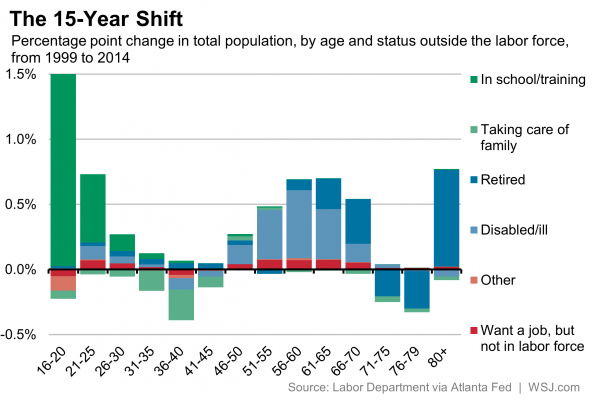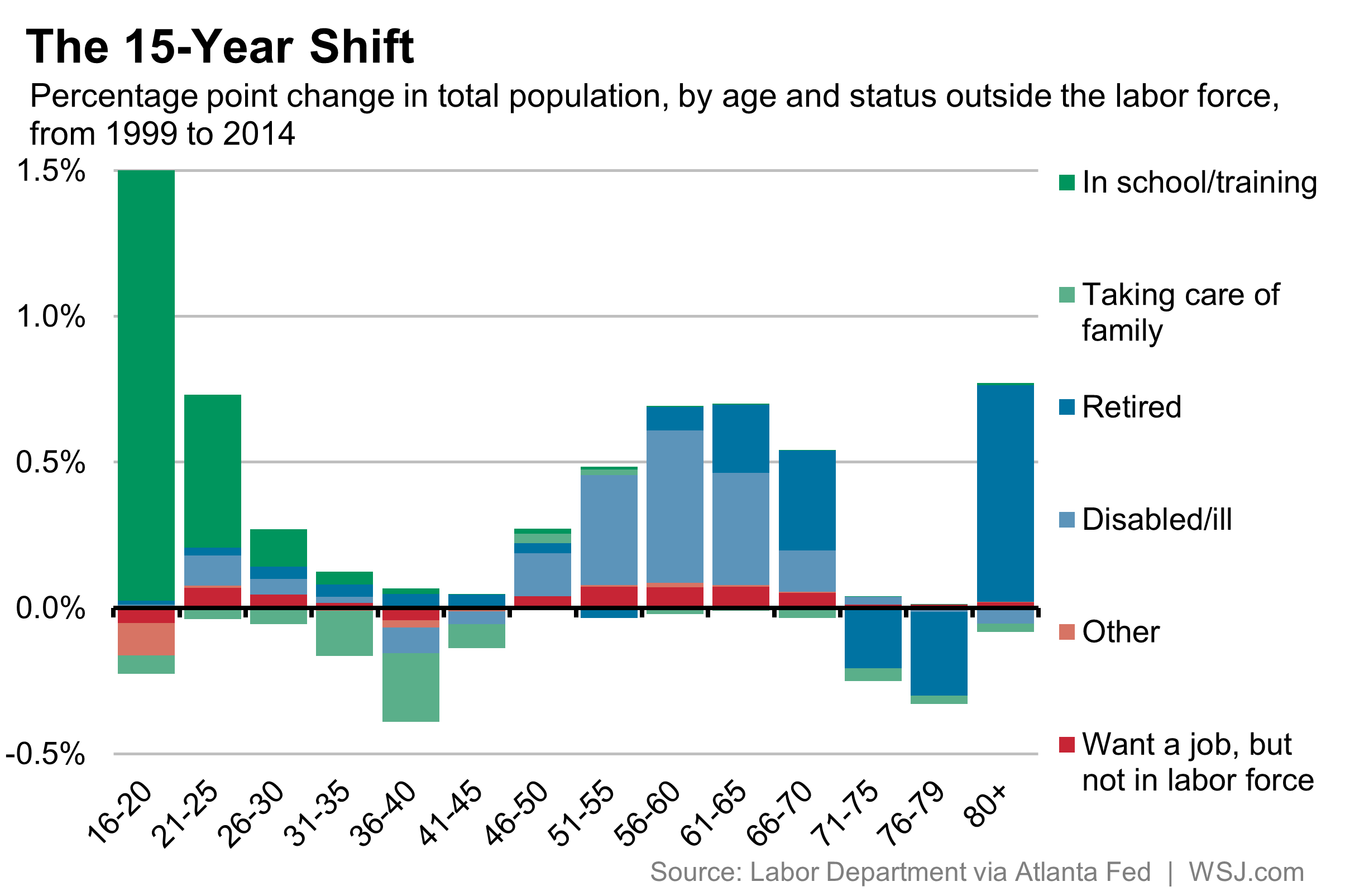How we can repair the labor market, in one chart


A free daily email with the biggest news stories of the day – and the best features from TheWeek.com
You are now subscribed
Your newsletter sign-up was successful
One big question mark in the recovery from the Great Recession is people who are out of the labor force entirely — they're not employed and they're not looking for work. They've been growing as a portion of the American population since the late 1990s, and spiked after the Great Recession. So everyone's wondering if this shift is permanent, or if a lot of these people can be brought back in.
A new analysis by The Wall Street Journal suggests a fair number of them can.

(Graph courtesy of The Wall Street Journal)
The Week
Escape your echo chamber. Get the facts behind the news, plus analysis from multiple perspectives.

Sign up for The Week's Free Newsletters
From our morning news briefing to a weekly Good News Newsletter, get the best of The Week delivered directly to your inbox.
From our morning news briefing to a weekly Good News Newsletter, get the best of The Week delivered directly to your inbox.
A lot of people dropped out of the labor force either by staying in school or by retiring early. Neither solution is great: more education comes with more student debt, and early retirement means reduced benefits. But they may be the best option for people when jobs are scarce. Obviously, we may run out of time to get early retirees back into the labor market. But a lot of people in school can obviously be brought back in, if we get job growth going again.
Another big story here is the rise of disability as a form of early retirement (in light blue). There's a fair amount of evidence disability benefits have risen to offset the decay of workers' compensation programs. But disability itself is also relative: If you've injured your back and can't do manual labor, but a lackluster economy means there are no desk jobs in your community, or it's too late for you to acquire the skills for a desk job, then you're disabled for all intents and purposes. So this category is at least somewhat amenable to more robust job growth as well.
In short, with the right macroeconomic policies to restore job growth and full employment, there's every reason to think labor force participation can be brought back up.
A free daily email with the biggest news stories of the day – and the best features from TheWeek.com
Jeff Spross was the economics and business correspondent at TheWeek.com. He was previously a reporter at ThinkProgress.
-
 Can Europe regain its digital sovereignty?
Can Europe regain its digital sovereignty?Today’s Big Question EU is trying to reduce reliance on US Big Tech and cloud computing in face of hostile Donald Trump, but lack of comparable alternatives remains a worry
-
 The Mandelson files: Labour Svengali’s parting gift to Starmer
The Mandelson files: Labour Svengali’s parting gift to StarmerThe Explainer Texts and emails about Mandelson’s appointment as US ambassador could fuel biggest political scandal ‘for a generation’
-
 Magazine printables - February 13, 2026
Magazine printables - February 13, 2026Puzzle and Quizzes Magazine printables - February 13, 2026
-
 TikTok secures deal to remain in US
TikTok secures deal to remain in USSpeed Read ByteDance will form a US version of the popular video-sharing platform
-
 Unemployment rate ticks up amid fall job losses
Unemployment rate ticks up amid fall job lossesSpeed Read Data released by the Commerce Department indicates ‘one of the weakest American labor markets in years’
-
 US mints final penny after 232-year run
US mints final penny after 232-year runSpeed Read Production of the one-cent coin has ended
-
 Warner Bros. explores sale amid Paramount bids
Warner Bros. explores sale amid Paramount bidsSpeed Read The media giant, home to HBO and DC Studios, has received interest from multiple buying parties
-
 Gold tops $4K per ounce, signaling financial unease
Gold tops $4K per ounce, signaling financial uneaseSpeed Read Investors are worried about President Donald Trump’s trade war
-
 Electronic Arts to go private in record $55B deal
Electronic Arts to go private in record $55B dealspeed read The video game giant is behind ‘The Sims’ and ‘Madden NFL’
-
 New York court tosses Trump's $500M fraud fine
New York court tosses Trump's $500M fraud fineSpeed Read A divided appeals court threw out a hefty penalty against President Trump for fraudulently inflating his wealth
-
 Trump said to seek government stake in Intel
Trump said to seek government stake in IntelSpeed Read The president and Intel CEO Lip-Bu Tan reportedly discussed the proposal at a recent meeting
